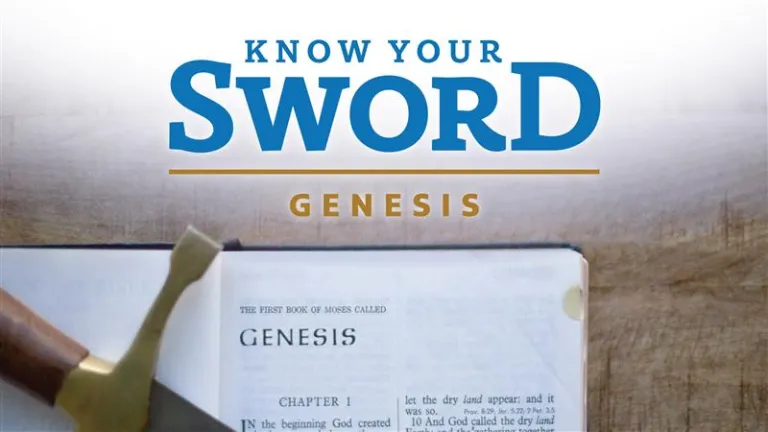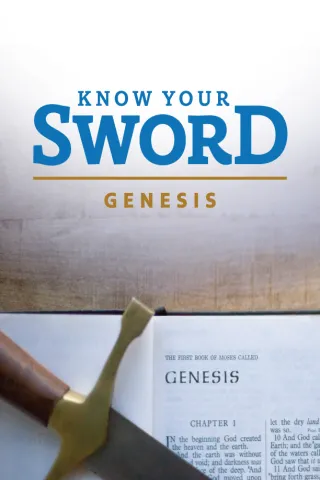Genesis Part 025

In Genesis 14:20 we see Abraham tithe. This is the first time we see the word “tithe,” but it would be a mistake to think this is the first time this was practiced.
We have read in previous lessons about the Babylonian system. In Genesis 14, we touch on this again with the story of Lot. There are a lot of ideas about who all these kings were that are listed in Genesis 14:1-2, but we don't know for sure. For example, the first King Amraphel, some say he is the King of Babylon, others the King of Assyria, others say this is Nimrod himself, and again others say it’s one of his descendants. What we do know is that the “Babel” idea of creating “kingdoms” and ruling over others is in full swing and in it all Lot, his household and his goods are taken.
Abram was rich in flocks, herds, and gold. He possessed a large household consisting of those persons whom he acquired, either by purchase or through voluntary association. But this chapter also shows Abram as allied with three Canaanite chieftains—Mamre, Eshcol and Aner—and Abram himself is able to field a fighting troop of 318 men. Abram also appears to be rather skilled in the art of warfare. While it may seem odd for this man of God to be so engaged, one should bear in mind that Canaan was not a place of pleasant pastures and relative safety. Bandits often roamed the hill country, the Negev was often raided from the south and east, and relations between the various city-states were sometimes uneasy. Abram was right in the middle of all this.
The common picture many have today of Abram as a simple nomadic shepherd is incorrect. In Genesis 23:6, he is identified as a “mighty prince” among the people of the land. Though he was certainly rich in flocks, we should see him more as a “merchant prince” leading a wealthy caravan.
In Genesis 14:20 we see Abraham tithe. This is the first time we see the word “tithe,” but it would be a mistake to think this is the first time this was practiced.
To Melchizedek Abram gave a tithe, or tenth, of all he had taken in battle. We will explore the topic of Melchizedek in tomorrow’s lesson. To the king of Sodom Abram returned the remaining goods, refusing to take any payment lest Abram’s wealth be attributed to his battle victory instead of the graciousness of God.

Concerning tithing, the Bible doesn’t say whether any of Abram’s ancestors or contemporaries also practiced it. Yet secular history reveals it as quite prevalent in the ancient world. The Zondervan Pictorial Bible Dictionary states: “Just when and where the idea arose of making the tenth the rate for paying tribute to rulers and of offering gifts as a religious duty cannot be determined. History reveals that it existed in Babylon in ancient times, also in Persia and Egypt, even in China. It is quite certain that Abraham knew of it when he migrated from Ur (Genesis 14:17-20) . . . By Abraham’s day the giving of tithes had been recognized as a holy deed (cf. Hebrews 7:4).” Indeed, The Encyclopedia Britannica says that “the custom was almost universal in antiquity” (11th ed., vol. 26, “Tithes,” p. 1019). For this godly custom to have been so widespread, it is reasonable to believe that God had earlier given instructions to mankind regarding it—perhaps as far back as Adam and Eve.
Let’s consider then, did Abram tithe to simply honor God with a popular religious custom of the day? Or did he understand tithing to be a divine law instituted by the Creator? God later said of him, “Abraham obeyed My voice and kept My charge, My commandments, My statutes, and My laws” (Genesis 26:5). This disproves the widespread belief that the law of God didn’t come into effect until 400 years later in Moses’ day. For what statutes did Abraham keep? Interestingly, the practice of tithing is later listed as a statute of God (compare Leviticus 26:46; Leviticus 27:30); therefore, we would conclude that this was one of the statues Abraham kept. Rather than tithing being something Abram came up with on his own or simply copied from pagan societies of his day, it is far more logical and scripturally consistent to conclude that God had revealed tithing as a sacred duty—a law to obey.
To wrap up, let’s recall how many of God’s Royal Law’s we’ve already seen in place, long before Mount Sinai: the Sabbath, signs for appointed meetings/times, clean/unclean foods and tithing. These things were in place and remain in place.
Tomorrow we will discuss Melchizedek.
UYA Team | uya@ucg.org
United Young Adults (UYA) primarily serves the 18–32-year age group for the United Church of God. There are three main areas of contribution to the lives of the young adults: Promoting Spiritual Growth, Developing Meaningful Relationships and Making the Most of Your Talents. The Know Your Sword series is a daily expository message introducing God’s Word from a trusted perspective.



